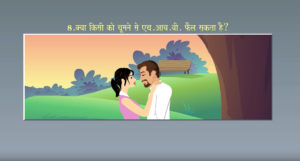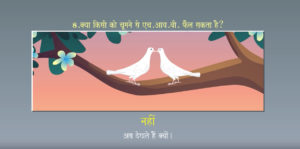Stanford alumna’s nonprofit, TeachAIDS, has brought culturally adapted HIV education to 82 countries
How do you teach AIDS prevention in cultures where societal taboos discourage discussions of sex? It took a background in performance, a compassionate heart and a Stanford education for Piya Sorcar to find a way.
Sorcar, MA ’06, PhD ’09, is founder and CEO of TeachAIDS, a nonprofit producer of culturally appropriate downloadable animations on HIV and AIDS.
Her Stanford PhD research fueled TeachAIDS’ strategy to convey HIV-prevention messages via cartoons created by and for people in India, Botswana, China, Kenya, South Africa, the United States and elsewhere. Today, 27 versions of these open-source materials are used in 82 countries.

For her work, Sorcar received one of three Alumni Excellence in Education awards bestowed in October 2016 by Stanford’s Graduate School of Education.
Sorcar comes from a family of performers and animators. Often “made to disappear” by her magician grandfather, she grew up acting and plotting storyboards. She learned how metaphor and euphemism can convey memorable content. In TeachAIDS animations made for India, two lovebirds represent a kissing couple; a bride and groom in wedding clothes accompany narration of sexual risk.

Sorcar’s father, animator Manick Sorcar, made the early drawings for the first TeachAIDS products. Health officials in South Korea funded pilot studies.
Backers include Yahoo!, UNICEF, Barclays Bank, Time Warner, Google and other governments. In 2011, MIT Technology Review named Sorcar one of the top 35 innovators in the world under 35.
The Graduate School of Education taught me how to think deeply about challenging issues and not jump to answers too quickly. I learned that solutions must be research-based and that good technology should be designed while considering the dignity of the people it seeks to serve.
Piya Sorcar, MA ’06, PhD ’09
Today, Sorcar is an adjunct affiliate at the Center for Health Policy in Stanford’s Freeman Spogli Institute for International Studies. She teaches an annual course, Designing Research-based Interventions to Solve Global Health Problems, to overflow classrooms of students from schools and disciplines across the university.
Go behind the scenes with Bollywood stars and other Indian cultural icons as they make TeachAIDS materials in seven languages.
Hear Tibetan Prime Minister Dr. Lobsang Sangay explain why his government partnered with TeachAIDS in 2016 to produce Tibetan-language materials.
Watch more on TeachAIDS’ YouTube channel.